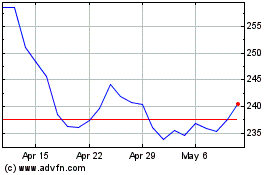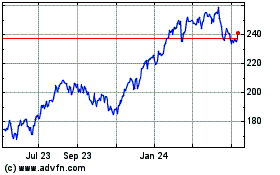The apartment sector, one of the best-performing of the
commercial real-estate market in recent years, is starting to lose
some appeal for investors.
Last year, residential rental properties were one of the most
sought-after property types, with sales totaling $54 billion by one
measure, up more than 50% from the prior year, according to Real
Capital Analytics. The average apartment price per unit, about
$102,000 nationally, is near peak levels.
But this year, the excitement is fading. Investors are pushing
back on property prices, rent growth is slowing and yields are
flattening in some markets.
While few investors believe apartment buildings will be a bad
investment, the best rent hikes of this cycle are likely "in the
rear-view mirror," said Andrew McCulloch, an analyst with REIT
research firm Green Street Advisors.
Such concern is weighing on the stocks of real-estate investment
trusts that own and develop apartment buildings. Shares of Colonial
Properties Trust Inc. (CLP) have gained less than 1% this year,
while sector giant Equity Residential (EQR) is up less than 3%. In
comparison, stock prices of industrial real-estate giant Prologis
Inc. (PLD) are up about 20% year-to-date while Brookfield Office
Properties Inc. (BPO) has gained 11%. Zelman & Associates, a
real-estate research firm, expects net operating income growth to
slow over the next year at the 10 apartment REITs it covers.
Investors and developers are changing course in response.
"Eighteen months to two years ago, you really could have owned
apartments in any major U.S. city and made very attractive
returns," said Jay Leupp, a portfolio manager at Lazard Asset
Management. Now "we are being more cautious of the apartment
investments that we make" and diversifying.
With the Lazard U.S. Realty Equity Open fund, for example, the
firm has in the last six months reduced its holdings in apartment
operators Equity Residential and Apartment Investment &
Management Co. (AIV) and beefed up shares in hotel operator
Marriott International Inc. (MAR) and First Industrial Realty Trust
Inc. (FR), which specializes in industrial space.
Other investors are also changing tack.
"It's a lot harder for people to buy and make money, as opposed
to building and making money," said Gary Kauffman, managing
director and head of U.S. transactions at Parsippany, N.J.-based
Prudential Real Estate Investors. Prudential will still look to buy
properties, he said, but is moving more toward constructing new
buildings.
There is some worry that a bubble could be forming, fed by
low-cost financing and aggressive cash-flow growth assumptions.
Research by economist Sam Chandan of New York-based Chandan
Economics, shows that multifamily buyers in competitive large
metropolitan areas last year were often too optimistic about their
future cash-flow growth. This could spell trouble if the owners
don't meet these targets and then must refinance at higher
rates.
But the overall argument for apartments, as Chandan and others
say, remains sound. People need to live somewhere, and apartments
have won out as the home-ownership rate has dropped. Over the past
five years, renter households have increased by more than 4
million, or 12%, according to Green Street, helping explain why the
sector was so healthy despite the ailing economy. And while job
growth has been weak overall, the upticks have been weighted toward
those more likely to rent.
As a result, vacancy rates have dropped to levels not seen in
years, allowing landlords to raise monthly rents. In the fourth
quarter, the vacancy rate fell to 5.2% from 6.6% a year earlier,
according to Reis Inc. Nationwide, landlords raised asking rents an
average of 0.4% in the fourth quarter, to $1,064 a month.
Yet some believe those rent hikes can't continue, especially as
the supply of new rental properties grows. Nearly 180,000 units
were started in 2011 and some 225,000 starts are expected this year
with an additional 280,000 starts in 2013, according to Zelman.
One market in particular that investors are watching is
metropolitan Washington, D.C., which is bracing for an onslaught of
new apartments even as the area's main employer, the federal
government, slows down hiring. AvalonBay Communities Inc. (AVB), a
large apartment owner, is tracking 8,600 new apartment units to
open this year and another 15,000 units in 2013.
"In specific markets, with D.C. really being the poster child,
we are worried about supply," said Zelman analyst Dave Bragg.
There is also concern about Seattle, which saw eight quarters of
vacancy-rate declines end in the fourth quarter, partially because
more than 1,800 apartment units were built last year, according to
Apartment Insights Washington LLC. More than 6,000 additional units
are expected.
-By Dawn Wotapka, Dow Jones Newswires; 212-416-2193;
dawn.wotapka@dowjones.com
Marriott (NASDAQ:MAR)
Historical Stock Chart
From May 2024 to Jun 2024

Marriott (NASDAQ:MAR)
Historical Stock Chart
From Jun 2023 to Jun 2024
